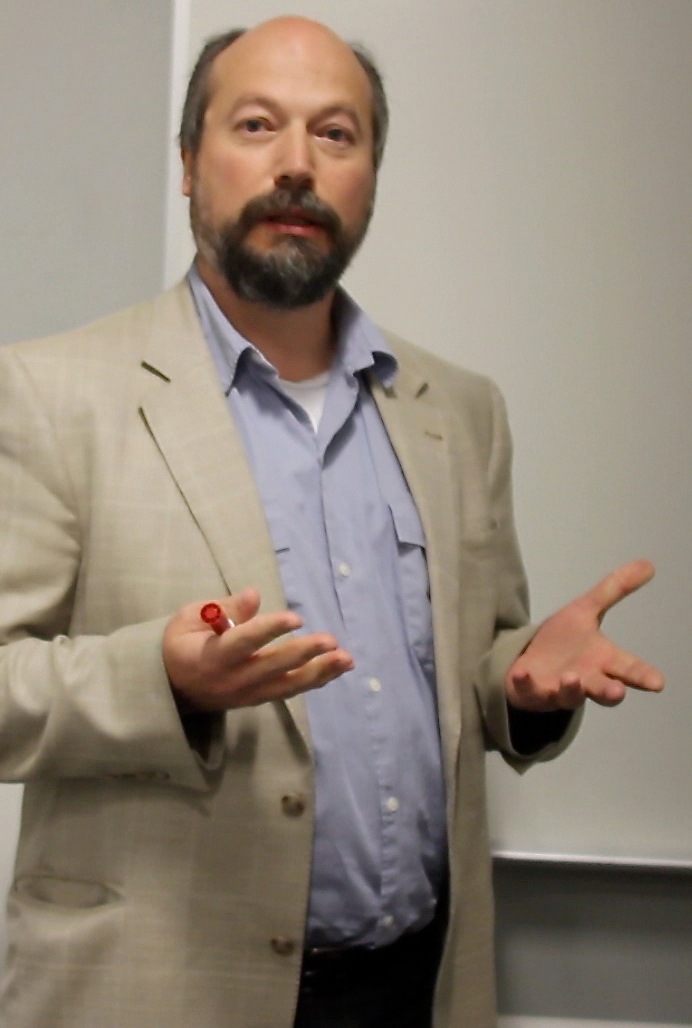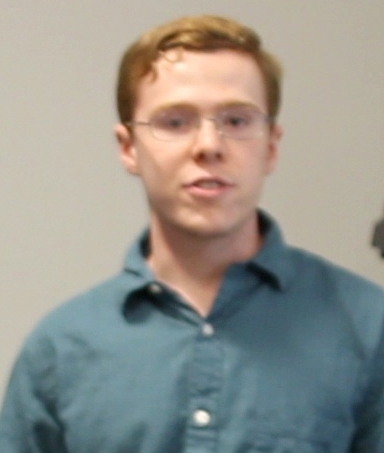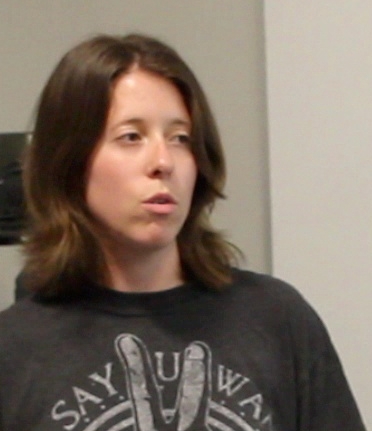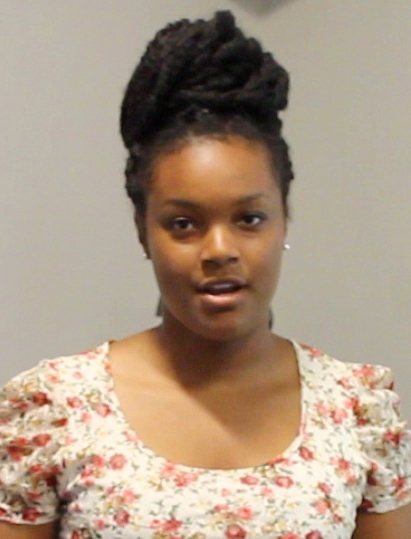'Disruptive Technologies' Seminar Popular with Young Students
July 31, 2013
 Nikos Chrisochoides
Nikos Chrisochoides
 David Jones
David Jones
 Julianne Osborne
Julianne Osborne
 Shanice McRae
Shanice McRae
Where do big ideas come from? Can students be taught to think outside the box? Is coming up with a big idea enough, or is it just as important to know how to communicate it? Nikos Chrisochoides, ODU's Richard T. Cheng Professor of computer science, decided last year to develop a 100-level seminar that would explore those questions.
"Computers in Health Care" was his title for the seminar, which seemed appropriate enough for this course, which is offered through the Department of Computer Science in conjunction with the ODU Honors College. But Chrisochoides was interested in students with a variety of interests and career goals, and the six students he ended up recruiting for the spring 2013 seminar are focused on biological sciences, psychology, business and physical therapy.
Chrisochoides is an outside-the-box thinker himself, known internationally for his expertise in medical imaging computing. Last year, he was elected a Distinguished Visiting Fellow of the Royal Academy of Engineering in the United Kingdom, which cited his contributions in "exascale mesh generation and runtime systems for medical imaging." Much of the ODU professor's work has been in cooperation with prestigious medical schools in the United States and China, and has involved cutting-edge strategies in computer image-guided neurosurgery.
If a computer scientist can think up ways to revolutionize brain surgery, why can't a freshman biology student at ODU do some creative thinking along the same lines? As Chrisochoides points out, rapid changes over the past half century in computing - how it's done and what it's used for - go a long way toward defining the "disruptive technologies" that create new products and services, and create excitement in the marketplace.
Chrisochoides has nothing against ideas that fine-tune an existing product or service, the so-called "sustaining" innovations. Nevertheless, the real fun, he says, comes from forking off from the main road in order to spark ideas that are audacious, yet obviously useful and efficient, and able to overwhelm the technology that came before it. That is what "disruptive" means.
"The stated description of the class is to study the role of computers as a disruptive technology in medicine and health care, and their direct or indirect impact on health care costs," Chrisochoides explains. "We use case studies from computer-assisted surgery and, specifically, image-guided therapy."
Still, he wanted the students to be guided - when they veer off from the road more traveled - by their own interests and backgrounds, not his. He asked the four young men and two young women in the course to think of a nonmedical technology that fascinates them, and then to "cut and paste" that technology onto to a challenge currently facing health care. Could the two seemingly unrelated sides of the proposition produce a new and disruptive technology?
David Jones, a freshman from Waynesboro, Va., who is studying marine biology, is a certified scuba diver, which led to his project, "Diving into Disruption." He wondered if his background might suggest some solutions for the treatment of chronic conditions, which are responsible for close to 75 percent of health care expenditures in the United States. These conditions include arthritis, asthma, diabetes and dementia.
Jones says he has long admired the business model for dive centers, which control most of the dive gear sales, scuba training and even diving tourism in the country. The innovations of the dive centers include 1) standardizing instruction, taking over from the Navy, which trained most of the early scuba divers; 2) focused sales of equipment in a field where knowledge of the sales staff is very important; and 3) group rates to allow for discounted travel to exotic diving locales.
"What if we could have a chronic condition center based on the dive center model?" Jones asks. Currently a single medical facility usually treats a variety of chronic conditions. "What if exams and treatment for one chronic condition happened under one roof?" Jones believes new efficiencies and therapy solutions could come from this model.
To demonstrate, Jones focused on chronic respiratory conditions like asthma and chronic obstructive respiratory disorder (COPD). Just suppose, Jones suggests, that instead of visiting their physician's practice regularly, respiratory patients entered cost-efficient training programs to learn effective self-management techniques. Imagine if these patients could patronize compact chronic condition centers with low-cost personnel and economical tools and services for managing their unique condition. Consider the benefits of chronic condition centers organizing group trips to distant hospitals for special operations, mimicking the scuba tourism packages that dive centers are known to promote. On trips like these, respiratory patients could enjoy socializing and traveling with other respiratory patients at reduced rates.
Jones and his classmates were required to give a PowerPoint presentation about their projects, and also write a final project paper. If Chrisochoides seems demanding in the realm of creative thinking, he is also a taskmaster when it comes to the presentation of ideas. Two required textbooks for the course are a style manual and a book on technical and scientific writing. When the students gave their PowerPoint presentations, Chrisochoides sat as their uncompromising judge. "You must be able to sell your idea," he says. "You must have a professional presentation."
"This freshman seminar has been one of the most unconventional, yet invaluable courses I have taken in my two semesters at Old Dominion," Jones wrote in an email after the semester had ended. "Dr. Nikos knows that excelling in the worlds of science and business demands more than just good grades. Throughout the semester, he instilled the values of critical reading, analytical thinking and effective written and oral communication in me and my fellow students. Through our discussions, we exercised our ability to express our ideas cogently and critique the ideas of our colleagues in a constructive, collegial manner. The seminar has been a highly rewarding experience, equipping me with the skills to be an innovator in my future career."
Julianne Osborne, a freshman from Yorktown, Va., who is interested in both psychology and biology, wondered if the research path that Dupont followed in the 1930s to create the synthetic fiber nylon might provide tips to scientists today who are creating synthetic DNA.
"When the class started, I felt like I had no idea what was going on," Osborne admitted. "I was surprised by how small the class was and I wasn't sure what was expected. After a few classes, I became more and more comfortable with the whole idea of a class seminar and became more comfortable with presenting information along with leading a group discussion. Before this class, my critical-thinking skills were very subpar, but after this class I definitely feel that my skills have greatly improved."
For Shanice McRae, a junior from South Hill, Va., her studies in biology and physical therapy have led her to believe that computing really does offer solutions for medical recordkeeping, even though electronic records so far have not necessarily improved the quality of health care. She suggested in her project that a patient's health records could be compiled in a fashion similar to the open encyclopedia format of Wikipedia. In other words, all of a patient's caregivers would have access to a single record for the patient, to read what's there or make entries. Wikipedia's experience with eliminating inappropriate postings or edits would come in handy, she says.
"I really enjoyed Professor Chrisochoides' course," McRae wrote in an email. "Not only is this class challenging, but also it gave me a great sense of involvement with my education. It's very easy to get used to taking courses where the content, assignments and research you complete is already selected for you, but with Professor Chrisochoides' course I was able to decide some of the content and research, and this made the course exciting and engaging."
Chrisochoides said he hopes to repeat the seminar soon because he has been encouraged by the positive reaction of the students, as well as of the chair in computer science, Desh Ranjan, and assistant chair, Janet Brunelle. He also said the course would not have been possible without the backing of David Metzger, dean of the Honors College; Chris Platsoucas, dean of the College of Sciences; and Carol Simpson, the provost.
Said Simpson, "I am delighted that Professor Chrisochoides volunteered to offer this seminar. Having students from different disciplines work in very small groups with an endowed professor is a wonderful experience for them."

